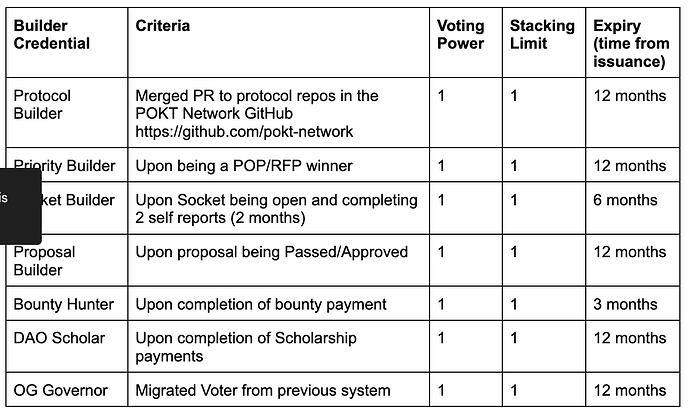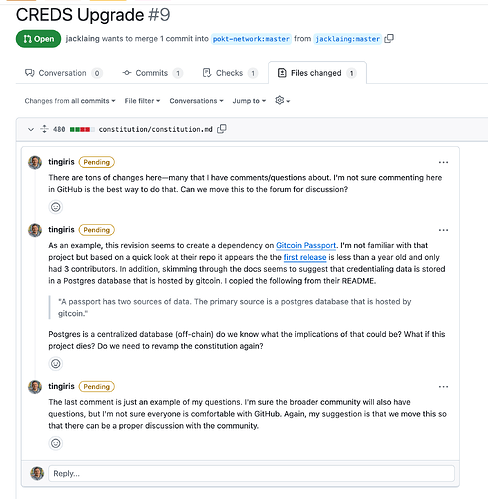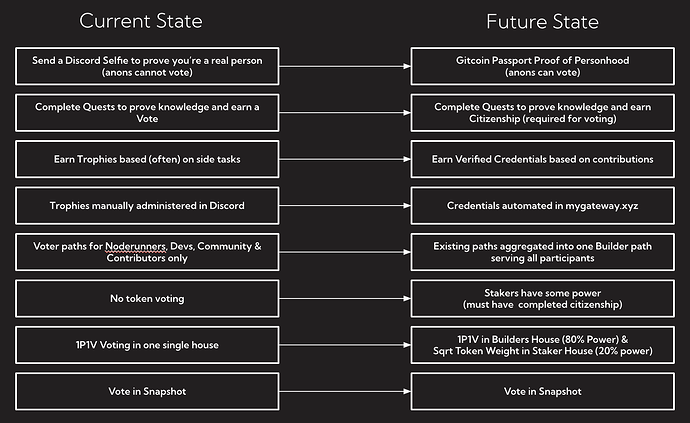Attributes:
Authors: POKT Network Foundation (PNF)
Implementer(s): POKT Network Foundation (PNF)
Category: Governance Upgrade
Replaces: PIP-1: Upgrade Governance to Improve Voter UX
Related: the PGOV series of forum posts. In particular, the reasoning for this change is found here.
Summary
PNF proposes a governance upgrade to enfranchise more of our community as DAO Voters, based on the principle that governance power is earned through reputation and cannot be bought. This expands, rather than replaces, the existing 1-person-1-vote (1P1V) system.
The core of the upgrade is enabling verified credentials to dynamically reflect a Citizen’s reputation in the network such that:
- Contributions to the DAO are recognised via a new set of BuilderCredentials (maintaining the existing 1-person-1-vote system, within a Builder House)
- Contributions of productive capital staked in the network are recognised via a new set of StakerCredentials (within a new stake-weighted Staker House), which will grant voting power to Nodes, wPOKT LPs, and Gateways
These two Houses are balanced through the HouseWeights parameter, which is set to 80% Builders / 20% Stakers.
Gitcoin Passport is introduced to reinforce our 1-person-1-vote system and enfranchise anons without them having to be doxxed to obtain a vote.
This proposal also involves updates to the POKT Constitution that are required to enable the upgrade.
The new voting system will kick in two weeks from the passage of this proposal.
Motivation
In August 2023 we outlined our reasoning for this governance upgrade in some detail here. Put simply, our motivation is to ensure that POKT’s best-in-class Proof of Participation model is able to scale. By modularising governance more clearly we can maintain flexibility over time, without impacting the system’s legitimacy or exposing it to capture.
The current system needs these updates to better reflect and represent POKT’s stakeholders, and to ensure that governance power continues to accrue to the “most knowledgeable and engaged” members of the community. By using verified credentials we can improve the speed, granularity and user experience of the system. With these foundations put in place, we can also start small but controlled experiments that introduce productive capital to governance.
Our motivation is to improve the existing system without opening it up to capture. Through many iterations and feedback from the community we now believe the proposal achieves this aim.
Specifications
The technical specifications of the system have been previously shared in the PGOV series of forum posts. However, the governance system operates through the combination of the following:
-
The technical architecture which defines the complete specification within this flow diagram
-
The updated powers, laid out in the Powers and Parameters section of an updated POKT DAO Constitution. We have loaded these in a PR and linked the diff for review
here
Edit: this PR was replaced with a more focused edit following feedback from the DAO, which can be viewed here.
We will update the PR based on any final feedback or comment, and once the vote passes, we will merge the PR into the repo here: https://github.com/pokt-network/governance/tree/master/constitution
Please note: The Constitution has been restructured to provide improved readability for anyone wanting to understand POKT’s governance, as well as to make the function of parameters, and active parameter delegations, more clear. Clauses that relate to outdated functionality, or were ambiguous, operational in nature, or duplicated details of the PNF Articles, have been removed, while other clauses have been reworded for clarity.
Edit: these more sweeping changes were reverted in favor of a more focused edit, following feedback from the DAO. This focused edit can be viewed here.
There will be two Houses within the POKT DAO, which will be weighted as follows:
- Builder House: 80% overall vote (1-person-1-vote)
- Staker House: 20% overall vote (stake-weighted)
- 50% Supply (Nodes / wPOKT LPs)
- 50% Demand (Gateways)
Builder House
The Builder House will be 1-person-1-vote, enforced by Gitcoin Passport and a BuilderPowerCap parameter that is set to 1.
This means that each credential below will earn a vote in the DAO, and that 1 Vote is the maximum power regardless of how many BuilderCredentials someone claims.
We will issue credentials earned since 1st January 2023 with the expiry period starting from genesis of the new system.
Staker House
The Staker House, which holds 20% of the overall vote, will be further divided 50/50 into Supply (Nodes/LPs) and Demand (Gateways).
These will be recognized with the following credentials:
The square root is used to equalize the voting power of whales relative to smaller stakers.
Calibrating Credentials Over Time
In the Constitution, PNF has delegated power over credentials (see the Parameter Delegates section) and will be able to issue new credentials and tweak criteria for existing credentials based on feedback from the DAO.
Edit: this delegated permission was removed following feedback from the DAO. Now the only parameter that PNF would have delegated permission over is the MinimumHumanityScore, as a safety mechanism because this protects the sybil-resistance of the DAO. Issuing new credentials would now require approved PUPs from the DAO.
Implementation
The system has already been designed, implemented and tested by the Microflow team. It is currently being reviewed and verified by external developers. You can review it yourself via the attached scenario here.
Implementation is focused mostly on the onboarding and migration of users with instructions captured in a new CREDS Governance Upgrade section of the POKT Docs.
Onboarding
The system is ready and we will start onboarding new “Citizens” from Monday 1st April. Instructions for new user onboarding can be found here.
The system also makes it possible for anyone, new voter or old, to have anonymity by following some privacy enabling practices. If you do not want to be doxxed to the DAO (or PNF) in voting you can follow these instructions.
Migration
Migrating our existing DAO Voters (whom we call OG Voters) to the new system is a major priority with the process captured here.
It’s our intention to make the onboarding and migration process as simple and effective as possible. We will be holding weekly office hours in Discord each Wednesday at 4PM ET / 1PM PST to support this onboarding. Our technology partners including Passport, Gateway and Snapshot will be available to join if needed.
System Cutover
All currently active Trophy claims (in the existing governance system) will have until the conclusion of the vote to be completed. After this, the Trophy system and all outstanding quests will be retired.
Once the vote passes, we will institute the following procedure for cutover:
- All active proposals in Snapshot will conclude using the existing voting system
- For a period of 2 weeks from the vote passing, no new votes will be activated so we can onboard and migrate as many DAO voters as possible
- On the 14th day after the vote’s passage, a genesis vote will be opened by PNF. This will allow a live test of the system with a special vote that we have planned. After this, new votes may be opened. These will be governed by the new system as set out in the specifications.
NOTE: You can earn your Citizenship and DAO vote starting Monday 1st April. The powers of the new system will only be activated based on the timing outlined in the cutover plan described above, but we will support (and recommend) onboarding to the system in advance of this time.
Lastly, OG Voter credentials will be issued from the date of the proposal passing and will expire after 12 months. While current DAO Voters will not be able to vote until they migrate to the new system, they will be able to do so at any time within these 12 months. However, to keep their vote after this 12-month period, they will need to re-earn it via the credentials included in the specifications (or any new credentials issued per “Calibrating Credentials Over Time”).
Rationale
The rationale for the upgrade and design decisions is already captured here, here and here.
In summary, updates to the system are required to:
- Allow anons to pass our personhood requirements. This is the rationale for using Gitcoin Passport.
- Support more rapid, granular and automated capture of reputation for entry to our 1P1V system. This is the rationale for using mygateway.xyz.
- Introducing Citizenship to define who can be a member of our DAO.
- Confirming that any Citizen contributing impact to the project will earn governance power. This is the rationale for renaming the 1P1V system the Builder House.
- Introduce controlled experiments for productive capital to participate in governance. This is the rationale for introducing the Staker House.
- Effectively balance power between builders and stakers. This is the rationale behind the creation of the HouseWeights parameter.
By updating the Constitution, we can enact this upgrade and provide clarity to the separation of powers between the DAO and the Foundation.



